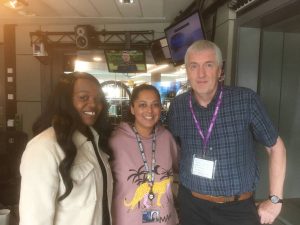|
“I think there is an issue that we, there is an elephant in the room. Right. And the elephant in the room, is the transatlantic slave trade and colonialism which no one ever wants to talk about despite the fact that it was one of the most significant and horrifying points in history probably in the entire existence of human beings. Whereby you had like for, for 400 years, people living in indentured slavery. I don’t even know, I can’t even imagine what it is like to be born into slavery and be tortured on a day to day basis. When those people who were given freedom, or civil rights in the 60’s, between 64 – 68, it is very, very recent history. And unfortunately for some reason none of those people were ever compensated in any way whatsoever. In fact what happened was the governments, even in the United Kingdom actually compensated the slave owners as opposed to the people who were enslaved. And the problem with that was that we didn’t actually deal with any of the psychological trauma, not just to people of colour but also to Caucasian and White people who lived through that, who might have participated in it and who might have not actually believed in it. None of that is being discussed. We don’t discuss it in our education system. We have things like Black History month which are like thrown on at the end, which should be part of our curriculum so that all of us understand this is what happened in history; this is why these people are here. And I really feel that that would reduce the amount of xenophobia. And I just want to say, actually funnily enough, for example, when those payouts were given, one of those gentlemen was actually an MP that I was reading about. And there’s are a number of different people. You are talking about figures of like 65 million in today’s money; you are talking about figures like 83 million that were paid out to replace say 15,000 slaves. And what you also have to understand is that capitalism as we know it is built on the back of slavery. Because pre-slavery in the 17th century things like banking really only existed in London. It didn’t really exist outside of that. It was actually invented for merchants and for traders because they needed to borrow to be able to go and exploit human labour. And many of the banks that we use today, whether it is Barclays, or its Lloyds, or it is Chase – they are still benefitting, many families whether the like it or not are living are living off the proceeds of crime essentially. |
|

BBC Radio Manchester interview
MJR trustees Beatrice Smith and Paul Keeble were interviewed by Asthma Younus on BBC Radio Manchester on Sunday morning about the forthcoming screening of ‘After the Flood:
